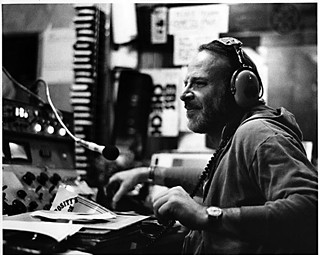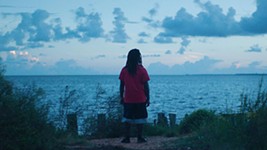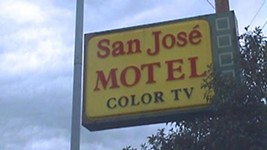When the Sixties Was Happening on FM Radio
AFS Doc Night: 'Radio Unnameable'
By Anne S. Lewis, Fri., Dec. 7, 2012
For 50 years now, the sleepless-in-New York set have warmed to the mellifluous, after-hours voice of Bob Fass, his "Good morning, cabal" sign-on signaling the start of Radio Unnameable, his midnight-to-dawn show on WBAI. Sitting in a cluttered, windowless space with just a couple of turntables and tape decks, a phone, and a mic, Fass – a pioneer of free-form, noncommercial radio – would free-associate his then five-nights-a-week program, taking it, well, practically anywhere. There were random call-ins and provocative, meandering dialogues (not a few drug-related); there were also drop-in musical guests: Fass friends like the young Dylan in comedic mode, Patti Smith, and Joni Mitchell. Jerry Jeff Walker and Arlo Guthrie went public for the first time with their respective versions of "Mr. Bojangles" and "Alice's Restaurant." Abbie Hoffman was a regular, Paul Krassner, too, and Timothy Leary – the list goes on. In its heyday, until the mid-Seventies, Fass' studio was a cross-cultural crucible for all the forces that brought us the Sixties.
In their film Radio Unnameable, directors/producers Paul Lovelace (co-director of The Holy Modal Rounders) and Jessica Wolfson (a producer on Trust Us, This Is All Made Up) create a visual and aural collage utilizing Fass' huge show archive, supplemented with original and historical footage conveying the 50-year trajectory of Fass' program.
Austin Chronicle: How would you describe Fass' significance?
Jessica Wolfson: In 1962 he created a radio show unlike any other. One unique feature about Radio Unnameable, particularly in the early days, is that people would drop by the studio unannounced. ... It was the afterparty of the downtown New York scene. It's mind-blowing the amount of freedom that Bob had and still has on the air. He was the first DJ to take multiple calls on the air and allowed the callers to dictate the direction of the show. Someone might call in to chat with Bob Dylan, and the next caller would report a demonstration or incident that was happening in his neighborhood. The following caller would offer support, and the guests in the studio would add their own ideas. It would progress from there. Parallels can be drawn to what Twitter and Facebook are doing today. Radio Unnameable was the social media hub of its time. It is the free-form radio at its very best, and no one else on the airwaves has provided that kind of freedom for his guests and listening audience.
AC: Today Fass is on only one night a week. What's changed?
JW: When Bob started, there was not a lot of competition on the airwaves, certainly nothing as free and creative as Radio Unnameable. The Internet has democratized media and allowed anyone and everyone the ability to have their own show or podcast or station. This is ... beneficial, but also problematic, as it can be harder to break through the clutter and build a substantial audience. In the case of WBAI, the audience ha[s] decreased since it was one of the most popular stations in New York City during the 1960s and '70s. But they have adapted as technology has evolved. You can stream Radio Unnameable anywhere in the world. And people do. Politically, Bob Fass ha[s] kept up with the times brilliantly. Most recently during Occupy Wall Street, demonstrators would take a break from Zuccotti Park and stop by the studio to talk with Bob. He's approaching 80, but is as determined as ever to utilize the airwaves in his own distinct way.
AC: What was your biggest challenge in making this film?
Paul Lovelace: Bob is sitting on a colossal archive. The sheer volume of material we had to condense into a digestible 90-minute film took a long time to assemble. And since radio is an aural medium, we had to figure out how to make it visual in the context of the film. Our goal was not to take a literal approach, but more of a collage of sights and sounds, keeping in the spirit of the program and the experience one has when listening to the radio in the middle of the night. Bob Fass was on the scene at every happening and antiwar demonstration with camera in hand, in addition to a portable tape recorder. He has a beautiful portfolio of photographs from the times. Additionally, we did a lot of outreach and were able to locate some amazing material from a wide variety of filmmakers and photographers, many [of whom] were listeners and participants of Radio Unnameable's monumental events.
AFS Doc Nights presents Radio Unnameable on Wednesday, Dec. 12, 7pm, at the Alamo Drafthouse South Lamar. Filmmakers Paul Lovelace and Jessica Wolfson will be in attendance for a Q&A, as will special guest Jerry Jeff Walker.









